Maintaining consistency across physical and digital marketing and sales channels while delivering personalized customer experiences remains a major challenge for CPG marketers. The fragmented nature of this data further reduces the agility needed to optimize strategies in real-time.
CPG analytics tools tackle these challenges by streamlining data collection, integrating insights across channels, and providing actionable intelligence to enhance operational efficiency.
In this guide, we reviewed the 7 best consumer packaged goods software solutions, highlighting their key features and how they help CPG brands streamline workflows and improve performance.
What Is CPG Data Analytics?
How can CPG Analytics Improve Business Metrics?
CPG analytics can significantly improve efficiency across various aspects of operations and decision-making by:
- Optimizing Supply Chain Management: Analyzing inventory levels, demand forecasts, and logistics data to reduce waste, avoid stockouts, and streamline distribution.
- Enhancing Marketing ROI: Identifying high-performing campaigns, optimizing media spend, and personalizing consumer engagement to maximize returns on marketing investments.
- Streamlining Product Development: Leveraging CPG consumer insights and market trends to create products that align with customer needs, reducing time-to-market and costly missteps.
- Improving Sales Performance: Analyzing sales trends and customer behavior to optimize pricing strategies, promotions, and product placement across channels.
- Driving Operational Efficiency: Automating data integration and reporting processes to reduce manual workloads, enhance accuracy, and accelerate decision-making.
- Enabling Real-Time Insights: Providing instant visibility into performance metrics, allowing teams to respond proactively to market changes and consumer demands.
In the following sections, we review the top 7 CPG analytics tools tailored to optimize various aspects of CPG operations.
1. Google Analytics
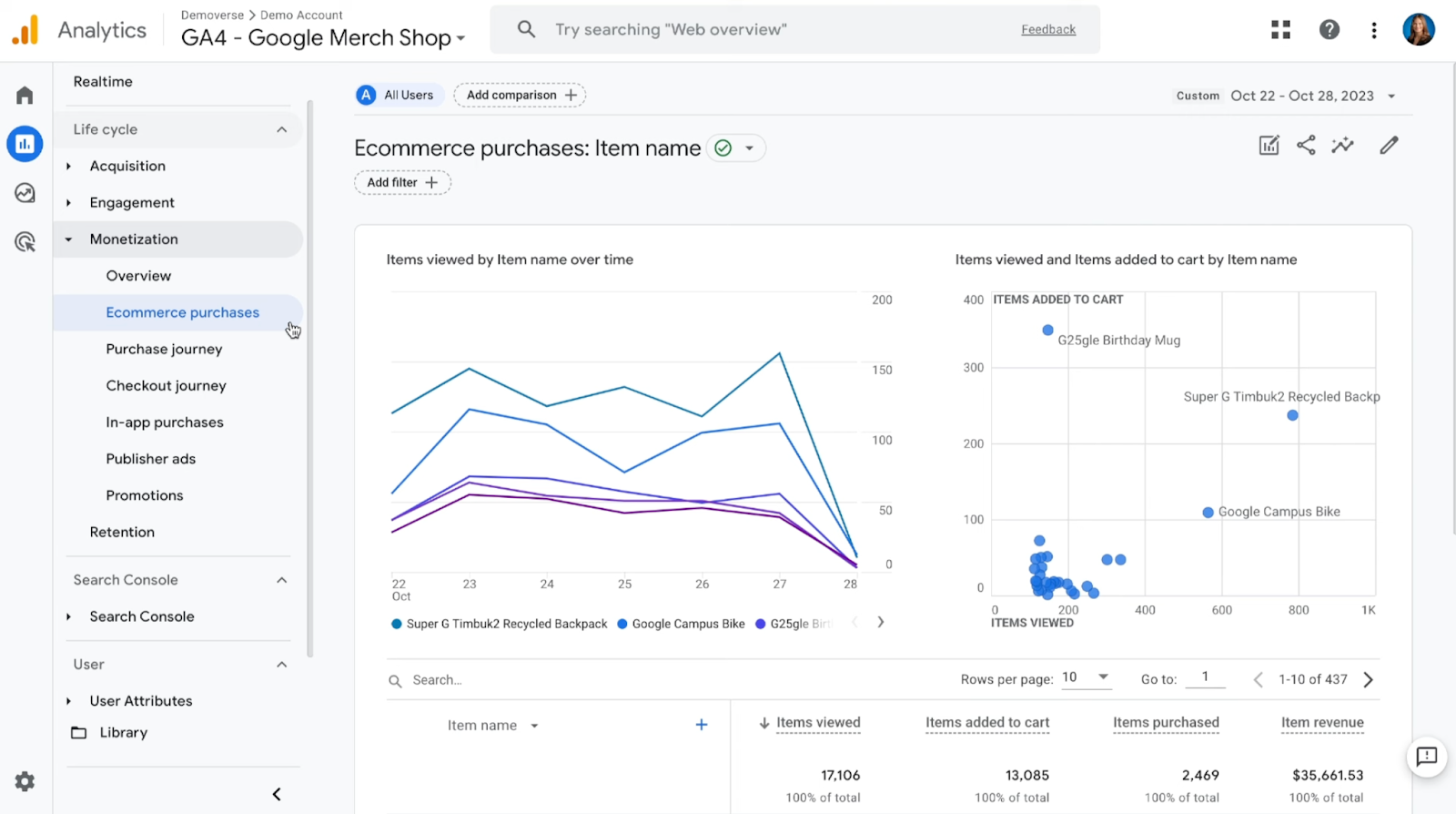
Google Analytics is a vital tool for many industries, including CPG. Google Analytics helps decode customer behavior and optimize their online strategies.
It provides actionable insights into website traffic, user engagement, and conversion patterns, helping brands navigate the complexities of consumer expectations and multi-channel retail environments.
Key Features:
- Customer Journey Analysis: Dive deep into customer interactions across digital touchpoints to understand purchase intent, identify drop-off points, and refine the path to purchase.
- Multi-Channel Attribution: Google Analytics helps evaluate the performance of paid ads, social media, organic traffic, and email campaigns in driving conversions, ensuring smarter resource allocation.
- Ecommerce Tracking: Gain granular insights into SKU-level performance, product page interactions, and cart abandonment rates to optimize digital shelves and maximize sales.
- Real-Time Data: Monitor consumer behavior and campaign performance in real time, enabling swift adjustments to promotions, product launches, or seasonal campaigns.
- Custom Dashboards and Reports: Design tailored dashboards for tracking specific KPIs like geographic performance, customer acquisition costs, and promotional impact across channels.
- Audience Segmentation: Identify high-value customer segments to create targeted campaigns and personalized offers, boosting customer loyalty and retention.
2. Improvado
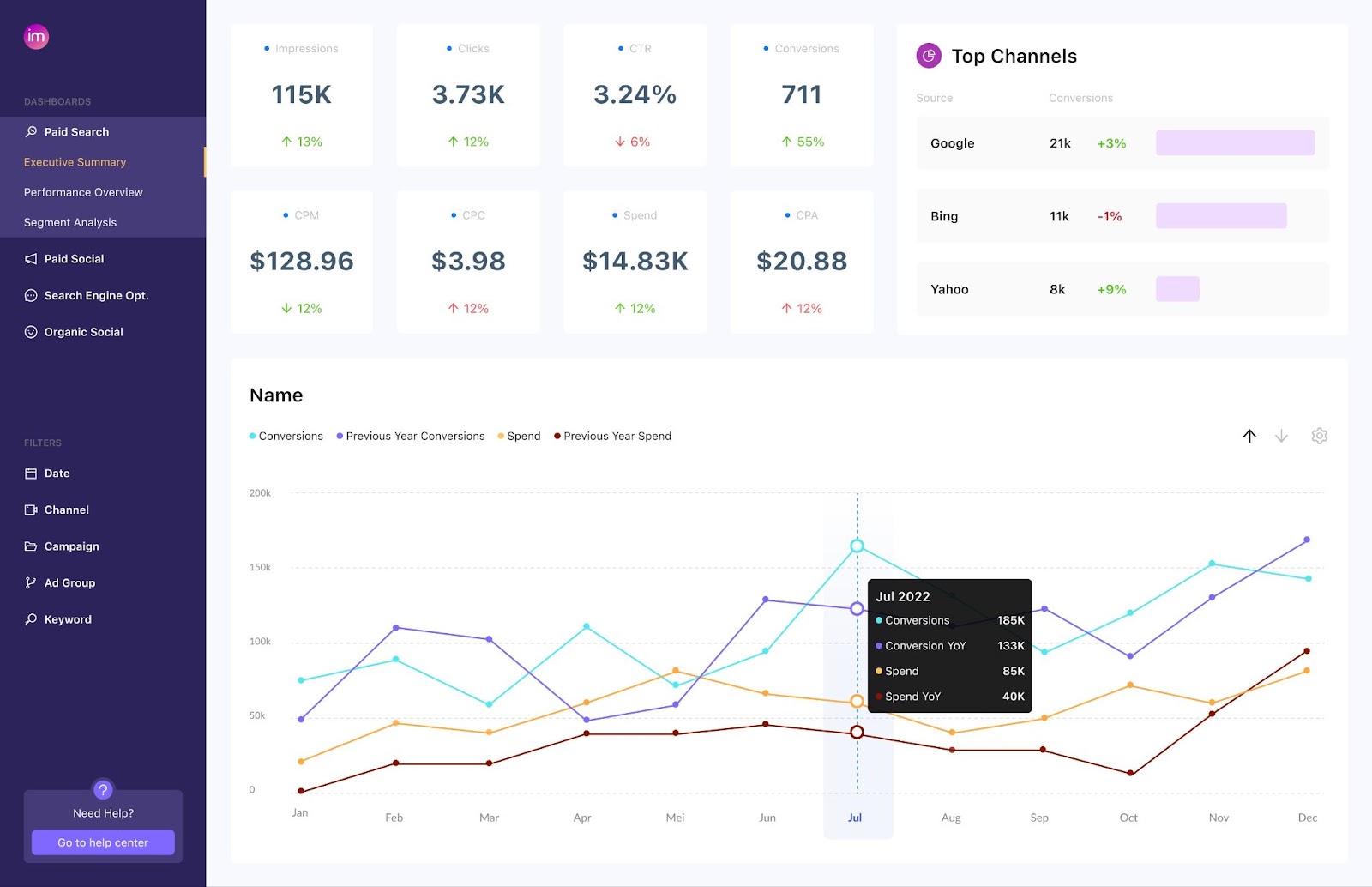
Improvado is a comprehensive marketing analytics solution designed to centralize, harmonize, and analyze data from multiple sources, making it a powerful tool for CPG brands managing complex marketing ecosystems.
Key Features:
- Data Integration Across Platforms: Seamlessly aggregate data from 500+ sources, including CPG solutions like Amazon, Walmart Connect, and Shopify. This provides a single, unified view of operations, enabling end-to-end visibility across retail and e-commerce channels.
- Scalability for Enterprise Needs: Handles large volumes of data across multiple locations and channels, integrates with offline and custom data sources, making it ideal for complex CPG operations.
- AI for CPG: Enables users to ask data questions in everyday language, bypassing the need for complex SQL queries. This makes it accessible for non-technical teams to analyze campaign performance, track sales by region, or pace metrics with ease.
- Automated Reporting: Eliminate manual reporting by automating data pulls, harmonization, and sync, saving time and reducing errors in campaign analysis.
- Cross-Channel Performance Analysis: Gain insights into how campaigns perform across digital and offline channels, helping optimize marketing spend and identify high-performing strategies.
- Real-Time Performance Tracking: Improvado provides a robust solution for campaign performance, brand safety, and data compliance tracking. It monitors adherence to pre-defined rules, paces metrics, and issues alerts for any anomalies or metrics drips.
- Cross-Channel Attribution: Captures every customer interaction across all campaigns and channels, including granular conversion and custom event tracking. Using common single-touch and multi-touch attribution models and custom ones, Improvado analyzes the impact of various touchpoints, helping businesses allocate ad spend effectively and maximize ROI.
- Customizable Dashboards: Improvado provides pre-built dashboard templates or builds tailored dashboards to monitor key metrics in a setup that works specifically for your CPG brand.
3. NielsenIQ
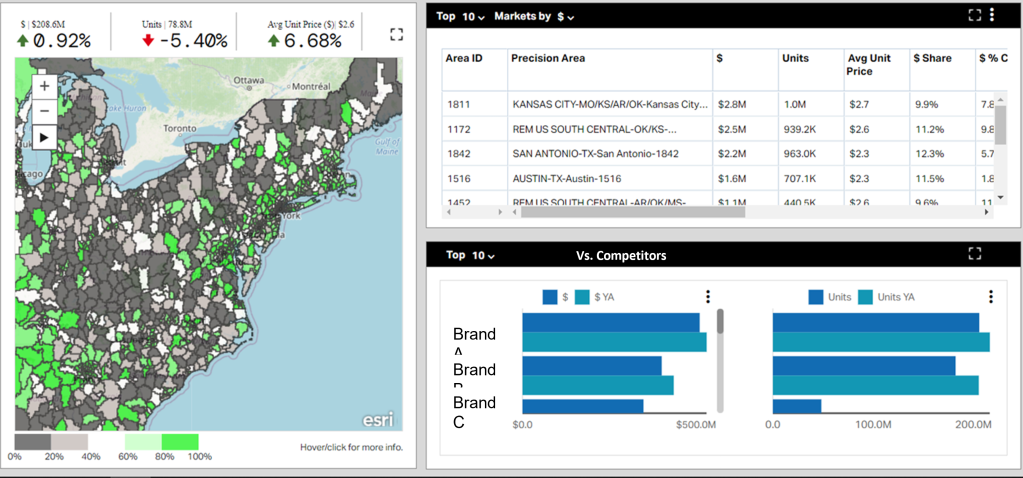
NielsenIQ is a trusted CPG software, offering comprehensive insights into market performance, consumer behavior, and retail trends. It provides businesses with the tools to understand demand, track competition, and optimize product strategies across physical and digital channels.
Key Features:
- Retail Measurement Data: Access granular sales data at the category, brand, and product level across regions and retailers, enabling brands to benchmark their performance against competitors and identify unmet market needs.
- Consumer Behavior Insights: Leverage data on shopper preferences, purchase frequency, and basket composition to design highly targeted campaigns and refine pricing, packaging, and promotional strategies.
- Category Management Tools: Use NielsenIQ to assess category trends, optimize SKU assortments, and improve shelf placement, ensuring that high-performing products get prime visibility both in-store and online.
- Omni-Channel Performance Tracking: Monitor campaign effectiveness and sales performance across ecommerce platforms, traditional retail, and hybrid environments, allowing for a unified view of consumer engagement.
- Market Share Analysis: Provides detailed CPG insights into your share of market revenue and volume by channel, region, or retailer, helping to pinpoint competitive advantages and areas needing attention.
- Custom Reporting and Visualization: NielsenIQ helps build tailored reports with advanced segmentation options to communicate actionable insights to stakeholders across sales, marketing, and supply chain teams.
4. Tellius
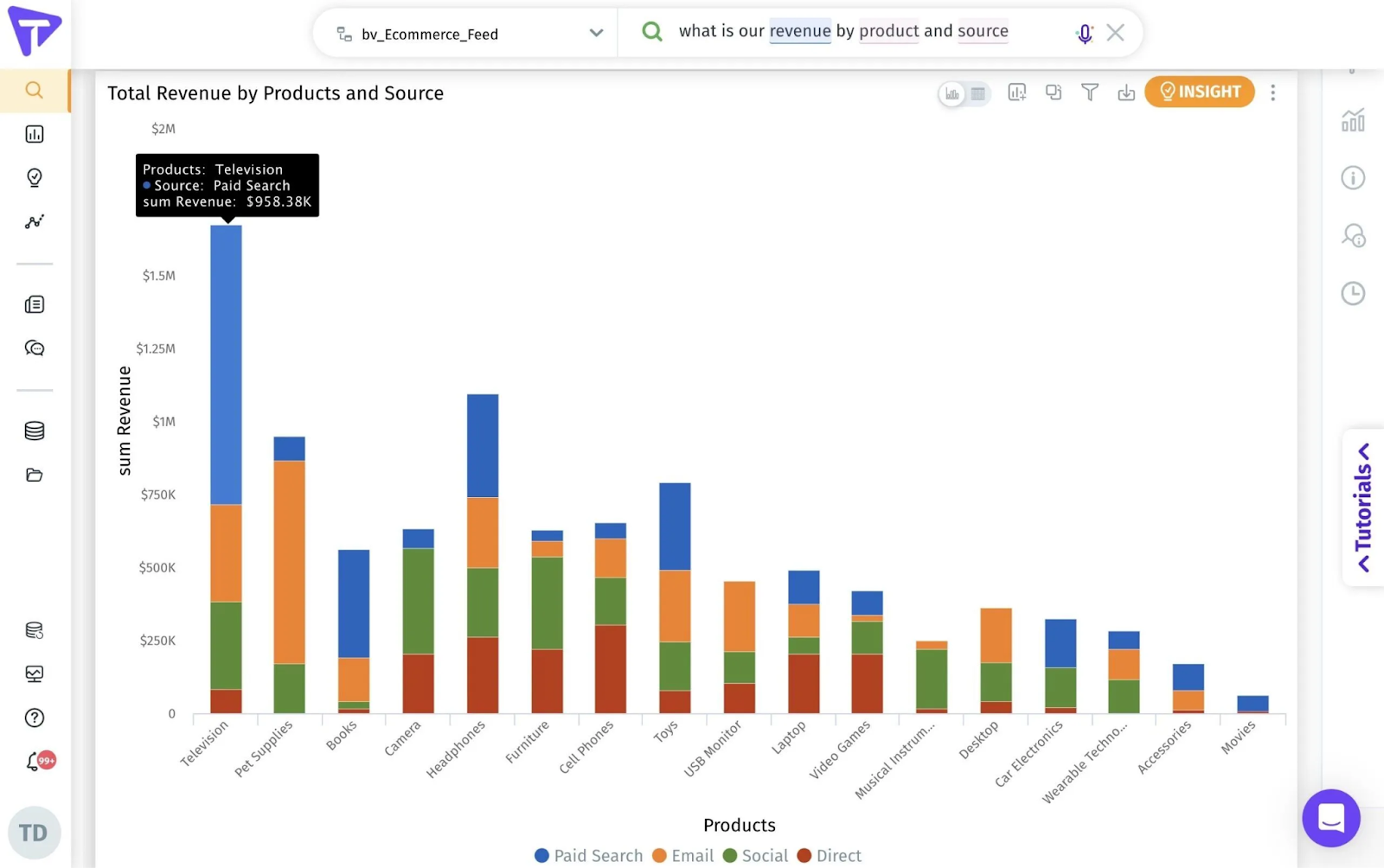
Tellius is an AI-powered analytics platform helping CPG companies with insights into consumer behavior, market trends, and operational performance. Its capabilities streamline consumer goods data exploration and decision-making, enabling brands to optimize strategies across categories, channels, and geographies.
Key Features:
- Natural Language Querying: Tellius integrates AI for CPG marketers to ask questions in plain language and quickly access insights on sales trends, campaign performance, and category growth without needing advanced technical skills.
- Automated Insights: Uses machine learning to uncover trends, anomalies, and patterns within large datasets. For example, it can detect underperforming SKUs, shifts in consumer preferences, or deviations in promotional effectiveness, helping brands quickly address issues and capitalize on opportunities.
- Data Integration: Aggregates data from diverse sources such as POS systems, consumer packaged goods CRM platforms, syndicated research, and social media analytics.
- Predictive Analytics: Utilizes AI models to forecast key metrics like demand fluctuations, revenue potential, and inventory needs. This allows brands to adjust supply chain strategies, reduce overstocking or understocking risks, and improve promotional planning.
- Self-Service Analytics: Empowers teams to create dashboards and perform analyses independently, without requiring constant support from IT or data teams. This accelerates insight generation for teams focusing on category performance, shopper trends, and pricing effectiveness.
- Driver Analysis: Offers detailed root-cause analysis to identify factors influencing outcomes such as sales declines, customer churn, or fluctuating ROI in campaigns. This helps pinpoint actionable levers to improve performance.
5. Semrush
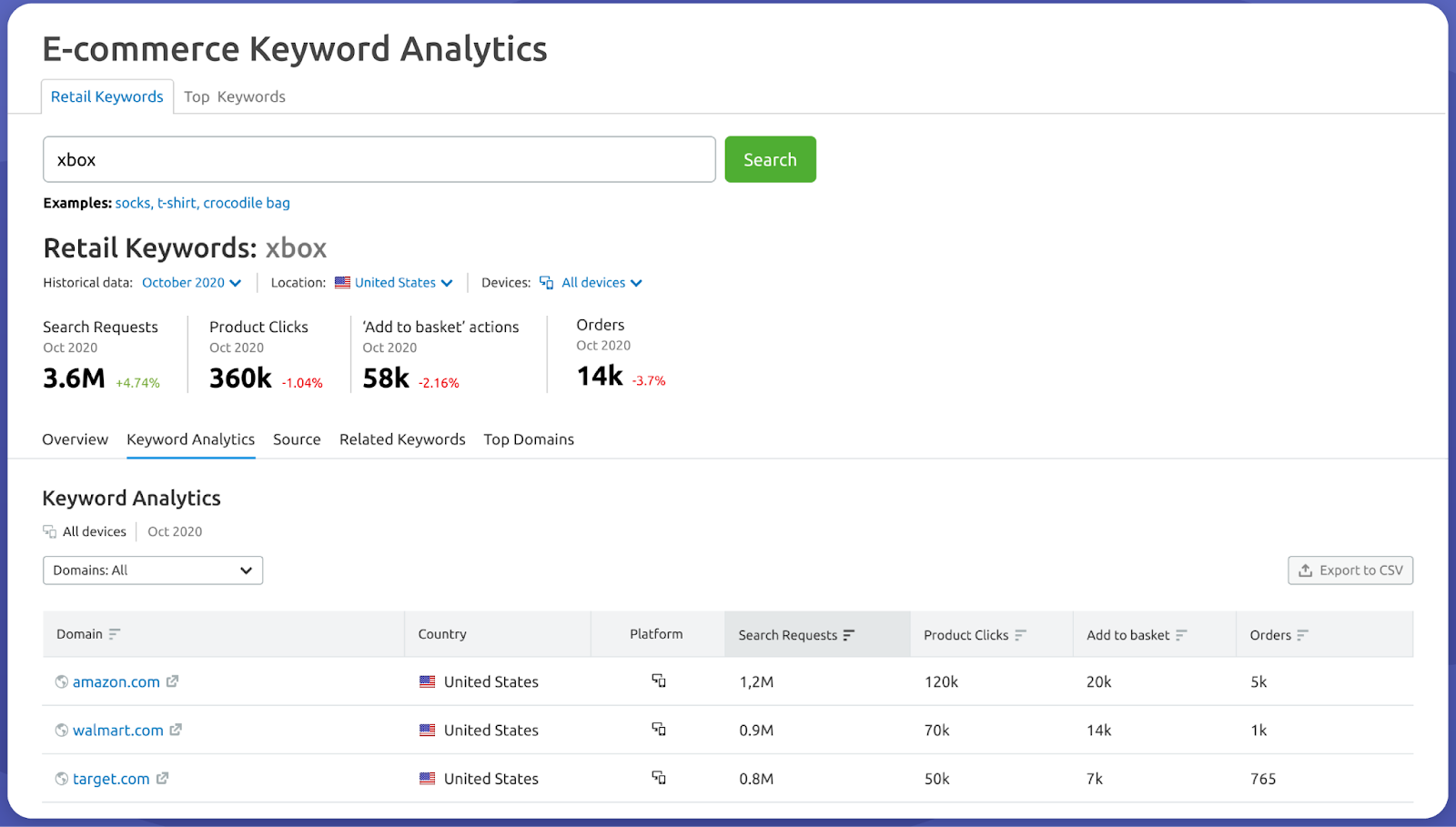
Semrush is not a dedicated CPG analytics tool but offers powerful capabilities for understanding market dynamics, optimizing online presence, and driving effective campaign strategies.
Key Features:
- Market Trend Analysis: Leverages search and online behavior data to pinpoint emerging consumer trends and demand shifts across product categories. This allows CPG brands to proactively align product launches and marketing strategies with market needs.
- Competitor Benchmarking: Provides detailed reports on competitor SEO rankings, advertising spend, and audience engagement strategies. This enables brands to identify gaps, refine their own approaches, and effectively position themselves in a crowded market.
- Ad Campaign Optimization: Tracks ad campaign metrics such as impressions, click-through rates (CTR), and conversions, providing actionable insights to maximize ad spend efficiency. This is particularly useful for evaluating paid search and display ad performance in real time.
- Content Marketing Insights: Evaluates content performance through metrics like engagement rates, keyword rankings, and audience reach. This helps brands refine messaging and ensure campaigns resonate with key demographics.
- Keyword Research for CPG: Identifies high-value keywords specific to product categories and consumer interests. This supports SEO and paid search strategies, improving discoverability for products in competitive digital environments.
6. Tableau
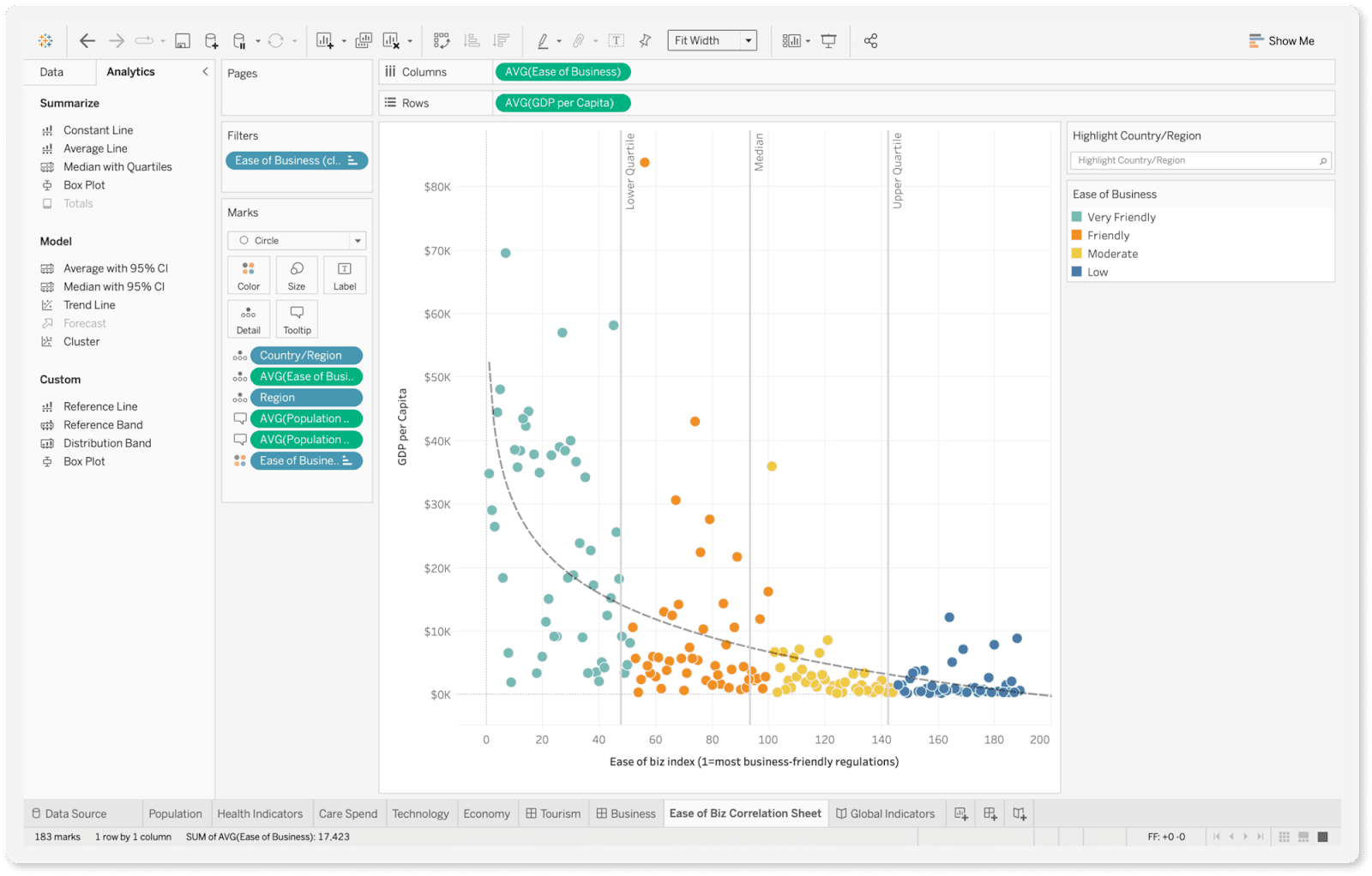
Tableau is a general-purpose business intelligence (BI) tool, not specifically designed for CPG analytics. However, its advanced visualization and data exploration capabilities make it a powerful resource for CPG brands looking to analyze complex datasets, track performance metrics, and derive actionable insights.
Key Features:
- Advanced Data Visualization: Tableau’s interactive dashboards allow CPG brands to visualize sales trends, inventory levels, and market performance, providing a clear picture of business metrics across geographies and product categories.
- Data Integration Flexibility: Connects seamlessly with diverse data sources such as ERP systems, retail sales databases, CPG CRM, and other solutions. This enables the unification of fragmented data for more comprehensive analysis.
- Customizable Reporting: Offers tailored reporting capabilities to address specific CPG needs, such as analyzing SKU performance, identifying top-selling products by region, or monitoring promotional campaign outcomes.
- Predictive Analytics: Uses integrated AI-driven forecasting tools to predict sales trends, optimize inventory levels, and plan marketing strategies, helping CPG companies make proactive business decisions.
- Collaboration Tools: Facilitates team collaboration by enabling users to share dashboards and insights across departments, ensuring alignment on strategic goals and priorities.
7. Zoho CRM
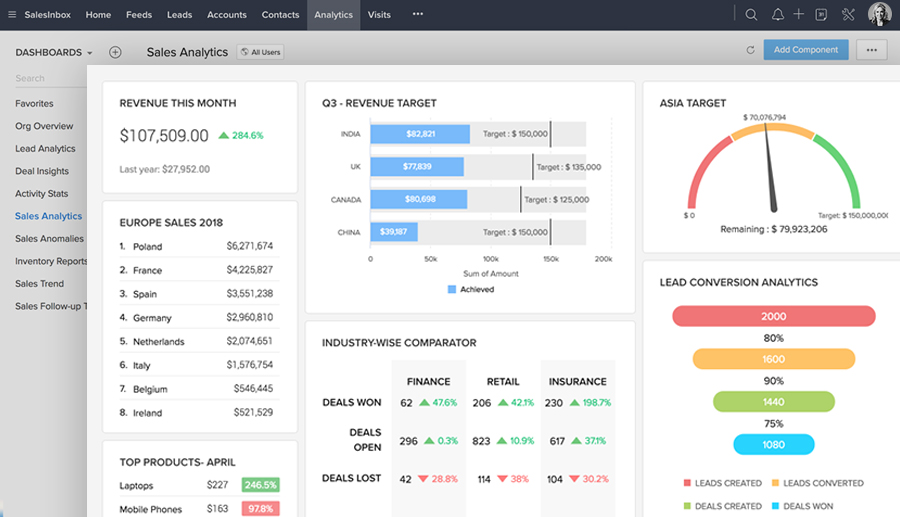
Zoho CRM is a versatile customer relationship management tool that can support CPG brands in managing customer data, streamlining sales processes, and enhancing customer engagement.
While not exclusively designed as a consumer packaged goods analytics tool, its comprehensive features make it valuable for tracking sales performance, managing distributor relationships, and understanding consumer behavior.
Key Features:
- Customer Insights and Segmentation: Allows CPG brands to segment their customer base by region, demographics, or buying behavior, enabling personalized marketing and targeted engagement strategies.
- Sales Pipeline Management: Tracks distributor and retailer interactions, monitors sales opportunities, and forecasts revenue, helping brands maintain clear visibility into their supply chain and sales channels.
- Customizable Dashboards: Provides tailored dashboards to monitor sales performance, track key accounts, and analyze distributor contributions, ensuring that teams have actionable insights at their fingertips.
- Automated Workflows: Streamlines repetitive tasks like order tracking, invoicing, and follow-ups, freeing up time for strategic initiatives and improving operational efficiency.
- Multi-Channel Communication: Integrates communication channels like email, phone, and social media, helping brands engage with distributors and retailers effectively while maintaining a cohesive customer experience.
Top Tech Stack for CPG Brands
Don’t underestimate the importance of a robust tech stack in the CPG industry. Without a strong analytics foundation, brands risk losing revenue due to missed insights and inefficiencies while struggling to scale effectively.
Consumer packaged goods data analytics tools are essential for turning fragmented data into actionable insights, optimizing strategies, and maintaining a competitive edge in an ever-evolving market.
Here’s a recap on the top 7 CPG analytics companies and their key strengths:
- Improvado: Best for unifying marketing and sales data across all channels, providing CPG brands with a single source of truth for tracking performance, optimizing campaigns, and boosting ROI. Get a demo to learn more about the platform and its analytics capabilities.
- NielsenIQ: Ideal for tracking market trends and benchmarking product performance in the retail space.
- Tellius: Perfect for leveraging AI to uncover hidden opportunities and automate analytics workflows.
- Semrush: Best suited for optimizing digital presence and staying ahead in online competition.
- Tableau: Ideal for creating highly customizable and visually appealing dashboards for enterprise-wide insights.
- Zoho CRM: Best for managing distributor and retailer relationships while improving sales pipeline efficiency.
- Google Analytics: Great for tracking online performance and enhancing consumer engagement strategies.
.png)



.png)
